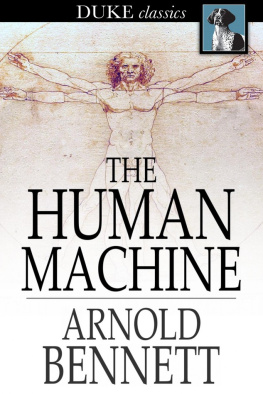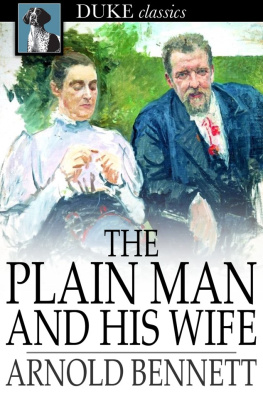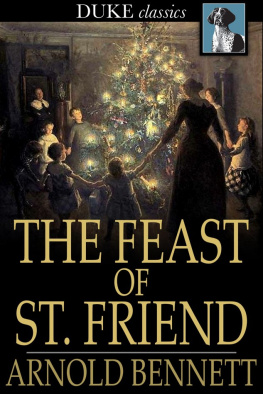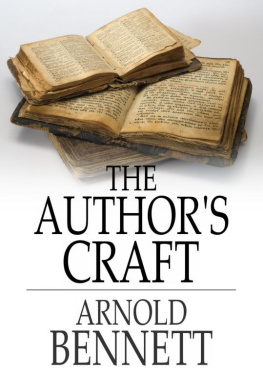THE INDUSTRIOUS APPRENTICE
An Excerpt From
Arnold Bennett
By F. J. Harvey Darton
By a custom not unusual among authors, Arnold Bennett has re- nounced one gift of his godparents. It may be a mere perversion of modesty; or it may be one of those practical, insidious attacks on the pubic memory which lead to the stereotyping of such labels as Henry Irving or Hall Caine: whatever the cause, the novelist of the Five Towns has sloughed a name. He was christened Enoch Arnold Bennett. Which noted, the first name may be left to resemble its first holder, of whom we are told that he " was not."
Arnold Bennett came into the world on 27th May 1867. On the same day of the same year was born the Card, Edward Henry Machin, and in the same year the nuptials of the Bursley old wives, Constance Povey and Sophia Scales (nes Baines), were celebrated. This exact chronological parallel between creator and created is hardly of profound significance, but it is one of a number of minor coincidences o f the kind.
" The town which had the foresight to bear me, and which is going to be famous on that score"a cheerful piece of mock egotism from The Truth about an Author was, more strictly, the district of Shelton, north-east of Hanley, in " The Five Towns " or Potteries. It is obvious that that whole region made an indelible impression on the young Arnold Bennett. He was evidently very sensitive to early impressions, and the minuteness of the local descriptions in the Five Towns novels reflects his extraordinary boyish receptivity. He says of the Baines' s shop, for instancethe scene of much of The Old Wives Talethat "in the seventies, I had lived in the actual draper's shop, and knew it as only a child could know it. He remembered also the sound of rattling saucepans when he was about two or three, and " a very long and mysterious passage that led to a pawnshop all full of black bundles." These are unexciting details, but they suggest that strange process of unconscious assimilation of environment during youth which so many authors transmute in later days into the fabr ic of life.
Arnold Bennett clearly discovered the solace of literature, in any real sense, after his school days were over, and it may perhaps be concluded that on the whole he received in youth little vital encouragement towards letters. It was not intended that the polite profession of writing was to furnish him with the bread and butter of life, much less the cakes and ale. Like Edwin Clayhanger, he was educated at Newcastle- under- Lyme, at the Endowed Middle School. He matriculated at London University (" that august negation of the very idea of a University ") about 1885, and thenceforth devoted himself to the study of the law, in the office of his father, a solicitor.
He left the Five Towns in 1889, and went to London, where he entered a solicitor's office, and " combined cunning in the preparation of costs with a hundred and thirty words a minute at shorthand." He received 200 a year for these services, and it was some time before he realised that he was one of Nature's journalists, and could earn greater sums by more cong enial work.
Yet the realisation might have come to him even earlier. Before he left Hanley he had been an unpaid contributor to a prominent local paper. It may have been the well-known Staffordshire Sentinel (the Signal of the novels) ; or it may have been an evanescent rival, like those connected with "Denry" Machin and George Cannon, the bigamous husband of Hilda Lessways. For some such journal, at any rate, he acted as local correspondent, and turned out, unfailingly, half-a-column a week of facetious and satirical comments upon the town's public and semi-public life. He tried also, during this early period, to write a short story and a serial: both failures. These experiences, no doubt, helped to give him facility, while they could hardly have afforded him room for useless vanity. If the solicitor's office did not drive him into literature, it at any rate permitted the study of it. Arnold Bennett collected booksas a collector, not as a readerand " simply gorged on English and French literature for the amusement I could extract from such gluttony." A chance observation by a friend, according to his own account, revealed to him that there might be an aesthetic side to art and letters: an equally fortuitous remark, a little later, suggested to him that he himself ( soi-disant , till then, the most callous and immobile of philosophers) might possess the artistic temperament. He won a prize of twenty guineas in a journal which it is hard not to identify as Tit- Bits . He had a story accepted by The Yellow Book . The thing was done, both psychologically and in the facts of the market: he was an author, a man of letters. The date of this new birth may be put approximate ly at 1893.
The Tit-Bits prize was awarded for a compact humorous compression of that famous one-thousand-pound competition serial, Grant Allen's Whats Bred in the Bone. The Yellow Book story (A Letter Home) now appears as the last of Tales of the Five Towns , with the footnote " written in 1893 " ; it appeared in print in 1895. That same year, 1893, saw the appearance of a work at once less ambitious and less loudly proclaimeda serial story in the children's magazine. Chatterbox , called Sidney York es Friend .
His activity soon became multifarious and incessant. Arnold Bennett turned free-lance journalist, contributing all manner of articles to all manner of magazines. He attained very soon a position of some security and responsibility, as sub- editor and subsequently editor of the woman's journal, Woman (now defunct). Before long he was a regular contributor to The Academy , then passing through a St Martin's summer of literary excellence under the editorship of Mr Lewis Hind (inspirer also of H. G. Wells). The mark of The Academy of those days was extreme clearness and flexibility of expression, wide knowledge, and a well-balanced alertness of judgment: there is to-day no literary journal quite o f the type.
Arnold Bennett also acted, during this period, as a fluent and omniscient reviewer, a dramatic critic, a playwright and a publisher's reader. An amusing account of these diversions appears in The Truth about an Author .
These were the outward signs of the apprentice author. The inward grace was a very deliberate and conscious study of what writing meant. In 1896 Arnold Bennett resolved to keep a journal.
"Already he had decided to be a successful author, and, as he viewed it, the keeping of a journal was a most valuable part of the apprenticeship to that career.... The peril he most dreaded was idleness, and the sin of thinking without writing."
The quotation is from a privately printed volume of selections from this journal ( Things that Interested me . Burslem, 1906); some extracts also appeared in Methuen's Annual (1914). The diary- keeper resolved to write in the journal so many words a day, to improve his powers of observation ; and he kept his word. The outcome of such discipline, joined to industry, may be judged from an entry made three ye ars later :







